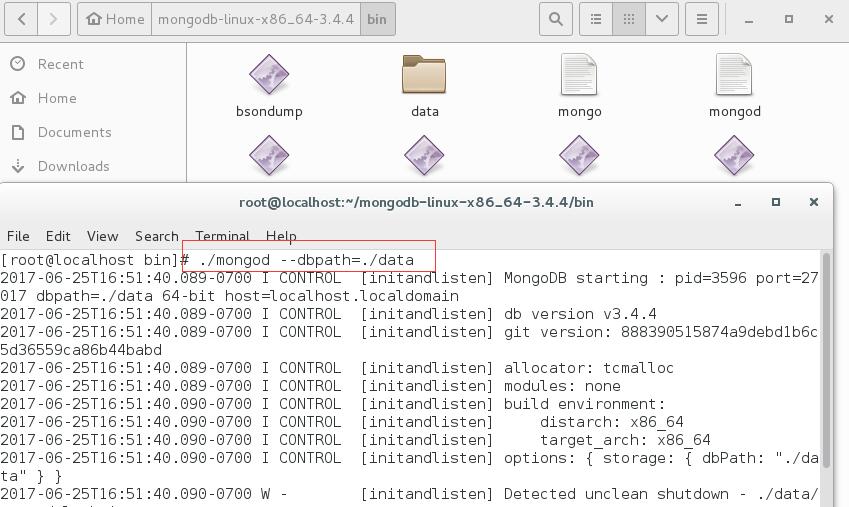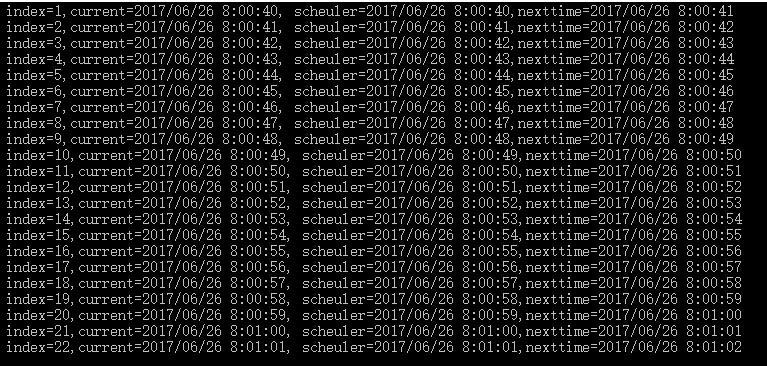使用mongodb作为Quartz.Net下的JobStore实现底层的持久化机制
我们都知道默认的Quartz底层采用的是RAMJobStore,所有的Job,Trigger,Calendar都是用Dictionary,SortSet等等这样的数据结构进行储存,相对来说性
能肯定快的没法说,但是面对灾难重启的时候还是很拿不出手的,而且都是全内存的,也没法实现多机器搭建Quartz集群,这一点还是很讨厌,虽然官方已经
提供了一些关系性持久化存储方案,但面对如今这么火的nosql,不进行官方支持还是有点可惜,不过基于Quartz本身的插拔式设计,一切都不是问题。
一:IJobStore
从github上下载源码:https://github.com/quartznet/quartznet,从源码你会发现IJobStore几乎实现了所有对Trigger,Job和Scheduler所有的容器管理操作。

然后你可以看到它的几个实现子类,全内存的RAMJobStore。
public class RAMJobStore: IJobStore { .... }
以及JobStoreSupport下的带锁JobStoreTX和不带锁的JobStoreCMT。
public class JobStoreSupport: IJobStore { .... } //带锁机制 public class JobStoreTX: JobStoreSupport { .... } //不带锁 public class JobStoreCMT: JobStoreSupport { .... }
所以你应该明白,本节课跟大家讲到的Redis和Mongodb的JobStore存储,必然也是实现了IJobStore接口,对吧。
二:MongoDB的JobStore
1. 安装mongodb
既然要使用mongodb,你必然要有mongodb的安装程序,可以去官网: wget https://fastdl.mongodb.org/linux/mongodb-linux-x86_64-3.4.5.tgz 一下,
这里我采用linux平台的centos。

2. nuget上pull些dll
大家可以在nuget控制台执行Install-Package Quartz.Spi.MongoDbJobStore,如下所示:
PM> Install-Package Quartz.Spi.MongoDbJobStore 正在尝试收集与目标为“.NETFramework,Version=v4.5.2”的项目“ConsoleApplication1”有关的包“Quartz.Spi.MongoDbJobStore.2.0.0”的依赖项信息 正在尝试解析程序包“Quartz.Spi.MongoDbJobStore.2.0.0”的依赖项,DependencyBehavior 为“Lowest” 正在解析操作以安装程序包“Quartz.Spi.MongoDbJobStore.2.0.0” 已解析操作以安装程序包“Quartz.Spi.MongoDbJobStore.2.0.0” 正在将程序包“Common.Logging.Core.3.3.1”添加到文件夹“C:\1\ConsoleApplication1\packages” 已将程序包“Common.Logging.Core.3.3.1”添加到文件夹“C:\1\ConsoleApplication1\packages” 已将程序包“Common.Logging.Core.3.3.1”添加到“packages.config” 已将“Common.Logging.Core 3.3.1”成功安装到 ConsoleApplication1 正在将程序包“Common.Logging.3.3.1”添加到文件夹“C:\1\ConsoleApplication1\packages” 已将程序包“Common.Logging.3.3.1”添加到文件夹“C:\1\ConsoleApplication1\packages” 已将程序包“Common.Logging.3.3.1”添加到“packages.config” 已将“Common.Logging 3.3.1”成功安装到 ConsoleApplication1 正在将程序包“MongoDB.Bson.2.4.2”添加到文件夹“C:\1\ConsoleApplication1\packages” 已将程序包“MongoDB.Bson.2.4.2”添加到文件夹“C:\1\ConsoleApplication1\packages” 已将程序包“MongoDB.Bson.2.4.2”添加到“packages.config” 已将“MongoDB.Bson 2.4.2”成功安装到 ConsoleApplication1 正在将程序包“Quartz.2.4.1”添加到文件夹“C:\1\ConsoleApplication1\packages” 已将程序包“Quartz.2.4.1”添加到文件夹“C:\1\ConsoleApplication1\packages” 已将程序包“Quartz.2.4.1”添加到“packages.config” 已将“Quartz 2.4.1”成功安装到 ConsoleApplication1 正在将程序包“System.Runtime.InteropServices.RuntimeInformation.4.3.0”添加到文件夹“C:\1\ConsoleApplication1\packages” 已将程序包“System.Runtime.InteropServices.RuntimeInformation.4.3.0”添加到文件夹“C:\1\ConsoleApplication1\packages” 已将程序包“System.Runtime.InteropServices.RuntimeInformation.4.3.0”添加到“packages.config” 已将“System.Runtime.InteropServices.RuntimeInformation 4.3.0”成功安装到 ConsoleApplication1 正在将程序包“MongoDB.Driver.Core.2.4.2”添加到文件夹“C:\1\ConsoleApplication1\packages” 已将程序包“MongoDB.Driver.Core.2.4.2”添加到文件夹“C:\1\ConsoleApplication1\packages” 已将程序包“MongoDB.Driver.Core.2.4.2”添加到“packages.config” 已将“MongoDB.Driver.Core 2.4.2”成功安装到 ConsoleApplication1 正在将程序包“MongoDB.Driver.2.4.2”添加到文件夹“C:\1\ConsoleApplication1\packages” 已将程序包“MongoDB.Driver.2.4.2”添加到文件夹“C:\1\ConsoleApplication1\packages” 已将程序包“MongoDB.Driver.2.4.2”添加到“packages.config” 已将“MongoDB.Driver 2.4.2”成功安装到 ConsoleApplication1 正在将程序包“Quartz.Spi.MongoDbJobStore.2.0.0”添加到文件夹“C:\1\ConsoleApplication1\packages” 已将程序包“Quartz.Spi.MongoDbJobStore.2.0.0”添加到文件夹“C:\1\ConsoleApplication1\packages” 已将程序包“Quartz.Spi.MongoDbJobStore.2.0.0”添加到“packages.config” 已将“Quartz.Spi.MongoDbJobStore 2.0.0”成功安装到 ConsoleApplication1
也可以到github中下载源码:https://github.com/chrisdrobison/mongodb-quartz-net

3. 启动运行
然后可以看一下此页面上的Basic Usage##上的默认配置:
1 var properties = new NameValueCollection(); 2 properties[StdSchedulerFactory.PropertySchedulerInstanceName] = instanceName; 3 properties[StdSchedulerFactory.PropertySchedulerInstanceId] = $"{Environment.MachineName}-{Guid.NewGuid()}"; 4 properties[StdSchedulerFactory.PropertyJobStoreType] = typeof (MongoDbJobStore).AssemblyQualifiedName; 5 // I treat the database in the connection string as the one you want to connect to 6 properties[$"{StdSchedulerFactory.PropertyJobStorePrefix}.{StdSchedulerFactory.PropertyDataSourceConnectionString}"] = "mongodb://localhost/quartz"; 7 // The prefix is optional 8 properties[$"{StdSchedulerFactory.PropertyJobStorePrefix}.collectionPrefix"] = "prefix"; 9 10 var scheduler = new StdSchedulerFactory(properties); 11 return scheduler.GetScheduler();
<1> PropertySchedulerInstanceName: 就是对Scheduler的Name进行的配置,大家可以根据情况定义一个简明释义的名字。
<2> PropertySchedulerInstanceId: 可以看到这个项采用的是machineName+NewGuid来保证Scheduler容器的SchedulerID唯一,唯一性特别重要,因为在
Cluster 中就是用它来保证唯一性的,不过上面的代码有点累赘,其实只要写上“AUTO”就可以了,由底层的
SimpleInstanceIdGenerator来保证uniqueID的生成,如StdSchedulerFactory.Instantiate方法源码所示:
1 if (schedInstId.Equals(AutoGenerateInstanceId)) 2 { 3 autoId = true; 4 instanceIdGeneratorType = LoadType(cfg.GetStringProperty(PropertySchedulerInstanceIdGeneratorType)) ?? typeof(SimpleInstanceIdGenerator); 5 } 6 else if (schedInstId.Equals(SystemPropertyAsInstanceId)) 7 { 8 autoId = true; 9 instanceIdGeneratorType = typeof(SystemPropertyInstanceIdGenerator); 10 }
<3> PropertyJobStoreType:这个属性将MongoDbJobStore作为底层的IJobStore实现者。
<4> PropertyDataSourceConnectionString,collectionPrefix: 这两个没什么好说的,一个是mongodb的connectionstring,一个是collection的前缀。
好了,下面就是我的完整代码:
1 static void Main(string[] args) 2 { 3 4 LogManager.Adapter = new Common.Logging.Simple.TraceLoggerFactoryAdapter() 5 { 6 Level = LogLevel.All 7 }; 8 9 var properties = new NameValueCollection(); 10 properties[StdSchedulerFactory.PropertySchedulerInstanceId] = "AUTO"; 11 properties[StdSchedulerFactory.PropertyJobStoreType] = typeof(MongoDbJobStore).AssemblyQualifiedName; 12 13 // I treat the database in the connection string as the one you want to connect to 14 properties[$"{StdSchedulerFactory.PropertyJobStorePrefix}.{StdSchedulerFactory.PropertyDataSourceConnectionString}"] = "mongodb://192.168.23.163/quartz"; 15 16 // The prefix is optional 17 properties[$"{StdSchedulerFactory.PropertyJobStorePrefix}.collectionPrefix"] = "prefix"; 18 19 var factory = new StdSchedulerFactory(properties); 20 21 //scheduler 22 IScheduler scheduler = factory.GetScheduler(); 23 24 scheduler.Start(); 25 26 var job = JobBuilder.Create<HelloJob>().WithIdentity("test", "datamip").Build(); 27 28 var trigger = TriggerBuilder.Create().WithCronSchedule("* * * * * ?").Build(); 29 30 if (!scheduler.CheckExists(job.Key)) 31 { 32 scheduler.ScheduleJob(job, trigger); 33 } 34 35 Console.Read(); 36 }
这个我自定义的HelloJob中,我特意记录一下scheduler的调度时间schedulertime和Trigger应该触发的时间nextFireTime。
1 class HelloJob : IJob 2 { 3 static int index = 1; 4 5 public void Execute(IJobExecutionContext context) 6 { 7 Console.WriteLine("{4} index={0},current={1}, scheuler={2},nexttime={3}", 8 index++, DateTime.Now, 9 context.ScheduledFireTimeUtc?.LocalDateTime, 10 context.NextFireTimeUtc?.LocalDateTime, 11 context.JobDetail.JobDataMap["key"]); 12 } 13 }
接下来执行一下:

然后通过robomongo到数据库看一下,有5个collection,里面都有数据,没毛病。

好了,本篇就说到这里了,当然还有基于redis的JobStore,有兴趣大家可以自己尝试一下。


